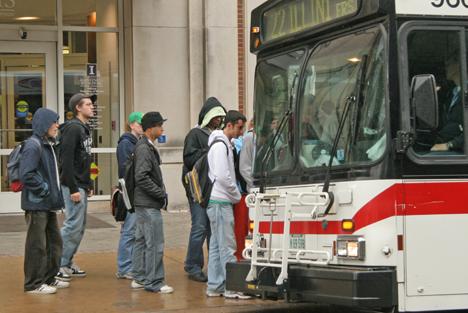MTD, UI to work to reduce emissions

John Paul Goguen The Daily Illini John Paul Goguen
October 17, 2006
The University and the Champaign-Urbana Mass Transit District are working together to research the effects of equipment that would reduce the amount of harmful emissions from MTD’s buses.
The University received a federal grant of $50,000 to help fund a project that will revamp four MTD buses to meet new Environmental Protection Agency standards.
According to a report released by Dr. Xinlei Wang, assistant professor of bioenvironmental engineering and the manager of the research project, older diesel-fueled buses often emit high levels of particulate matter, or soot. The toxic exhaust is harmful to both pedestrians and the bus passengers. Wang’s current research focuses on the development of after-treatment technologies to clean the exhausted air from the engine.
Although MTD buses meet emission standards from the time they were built, all 94 buses are not in compliance with the new, more stringent Environmental Protection Agency regulations which will take effect in 2007, according to the report. Emissions from these old engines currently are about six to 10 times higher than the new generation engines.
Wang said that the project calls for four buses to be retrofitted with the most advanced in diesel particulate filter technology. These devices, which are installed to replace the muffler, serve as exhaust treatment systems. They could remove as much as 85 percent of soot and 90 percent of carbon monoxide from bus emissions, according to a document released by Fleetguard Emissions Solutions, a company that develops technology to meet the rising demands of new environmental regulations.
Get The Daily Illini in your inbox!
Dave Moore, director of maintenance at MTD, said that the grant money will cover the costs of installing the units on the test buses.
Moore also said that the new filters will be tested on campus buses and studies will be done over the next two years to see if the devices are working as expected.
“The University will be judge and jury as far as determining if (the devices) work,” Moore said.
If the technology is effective, it would cost about $10,000 per bus to install the filter systems, and the MTD would seek more state and federal grants to help cover the cost, Moore said.
“There’s no problem with the buses now,” Moore said. “We are looking for ways to improve emissions on our fleet.”
Just this past year, Moore said, the sulfur content of diesel fuel nationwide was reduced from 500 parts per million to only 15 parts per million. This ultra-low-sulfur fuel will also aid in reducing harmful emissions.
Even though the devices need to heat up to 1000 degrees Fahrenheit to burn particulate matter into ash, Moore said that the buses are not expected to spend more fuel as a result.
Moore said that he is very optimistic about the outcome of the study.
“I wouldn’t be doing (the project) if I didn’t think the results would be positive,” he said.






